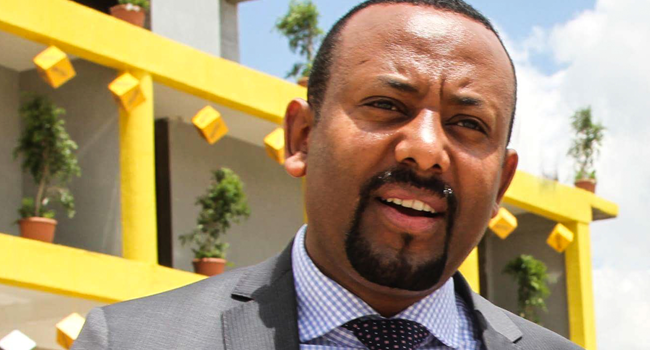‘We have Completed Military Operations In Tigray’, Says Ethiopian PM Abiy Ahmed
 In this file photo taken on March 28, 2018 Abiy Ahmed, Chairman of Oromo Peoples’ Democratic Organization (OPDO) looks on in Addis Ababa. Samuel Gebru / AFP
In this file photo taken on March 28, 2018 Abiy Ahmed, Chairman of Oromo Peoples’ Democratic Organization (OPDO) looks on in Addis Ababa. Samuel Gebru / AFP
Ethiopian Prime Minister Abiy Ahmed said Saturday that military operations in the country’s northern Tigray region were “completed” after the army claimed control of the regional capital, declaring victory in a three-week-old conflict that has left thousands dead.
“I am pleased to share that we have completed and ceased the military operations in the #Tigray region,” Abiy said in a Twitter post Saturday night.
Abiy, last year’s Nobel Peace Prize winner, announced on November 4 he had ordered military operations against leaders of the Tigray People’s Liberation Front (TPLF), the regional ruling party that dominated Ethiopian politics for nearly three decades before he came to power in 2018.
Tigray has been under a communications blackout ever since, making it impossible to know the full toll of fierce fighting that has included multiple rounds of air strikes and at least one massacre that killed hundreds of civilians.
After securing control of western Tigray and giving TPLF leaders a 72-hour ultimatum to surrender, Abiy announced on Thursday he had ordered a “final offensive” against pro-TPLF forces in the regional capital, Mekele, a city of half a million.
Global concern mounted over a possible bloodbath, and heavy shelling was reported in Mekele earlier Saturday.
But on Saturday night Gen Berhanu Jula, the army chief, said in a statement that his forces “completely controlled” Mekele.
A government statement specified that federal forces had been able to “take control of the airport, public institutions, the regional administration office and other critical facilities”.
Berhanu said his troops were now “hunting for members of the TPLF junta that are in hiding”.
There was no immediate response from the TPLF.
A long-running feud
Ever since Abiy took office, TPLF leaders have complained of being sidelined from top positions, targeted in corruption prosecutions and broadly scapegoated for the country’s woes.
Tensions rose dramatically after Abiy’s government postponed national elections scheduled for August, citing the coronavirus pandemic.
Tigray held its own elections the following month and branded Abiy an illegitimate ruler.
The military operations that began on November 4 were, in Abiy’s telling, triggered by attacks by pro-TPLF forces on two federal army camps in Tigray — one in Mekele and another in the town of Dansha.
On Saturday the government said it controlled the camp in Mekele and had secured the release of thousands of federal army officers held hostage there.
Despite Abiy’s triumphant statement, it was not immediately clear fighting in Tigray would end right away.
Tigray has considerable military assets, and at the outset of the conflict analysts estimated the TPLF could mobilise some 200,000 troops.
“The key next issues are what intent and capabilities do the Tigrayan forces have to continue armed resistance as an insurgency, and how will people react to the provisional government that will be established,” said William Davison, analyst for the International Crisis Group.
‘Rebuilding’ efforts
Abiy said Saturday night his government’s “focus now will be on rebuilding the region and providing humanitarian assistance” while police work to apprehend TPLF leaders.
Tens of thousands of refugees have streamed across the border into Sudan during the conflict.
Displacement is also believed to be widespread within Tigray.
The United Nations has spent weeks lobbying — so far unsuccessfully — for full access to the region.
Abiy’s office said earlier this week it would open a “humanitarian access route”.
Hundreds of UN and international NGO workers are currently in Mekele, but they are grappling with shortages of food, cash and other essentials.
The International Committee of the Red Cross said Friday it had received “1,300 requests from people in Ethiopia and abroad frantically looking to contact their relatives,” adding, “We know this is just the tip of the iceberg.”
Regional worries
From the moment fighting broke out, there were widespread fears the conflict would draw in the wider Horn of Africa region.
Rockets from Tigray targeted the capital of neighbouring Eritrea two times — once two weeks ago and again on Friday night.
The TPLF claimed responsibility for the first attack, though there has been no claim for the second.
The TPLF has accused Ethiopia of enlisting Eritrean military support in the conflict, something Abiy’s government has denied.
In a statement Saturday condemning air strikes in and around Mekele, the Tigray government accused Abiy of teaming up with Isaias Afwerki, Eritrea’s president, for the final assault.
“The Tigray regional state would like it to be known to friends and enemies alike that it will give proportional response to the massacres and property damages being done by those fascists,” it said.
Addis Ababa Saturday said the “aerial engagement has been precise and targets only TPLF’s military depot, weaponry and arsenals”, avoiding “civilian facilities”.





.jpeg)
Comments
Post a Comment